- Home
- Karen Traviss
Bloodlines Page 5
Bloodlines Read online
Page 5
“I prefer my club to having a home here,” said Niathal, as if Jacen looked curious. He was just feeling distracted by something that began nagging at the back of his mind. “Now, perhaps we can give further thought to this blockade, so—”
Jacen jerked his head around, suddenly seized by such a powerful sense of immediate danger that his instinct was to fling himself on Niathal and wrap the taxi tight in a Force shield. The vessel bucked hard as if it had been hit by a tidal wave. There was a second of silence before a deafening whump shook it like a box and they were caught in an instant blizzard of what seemed to be glittering snow. It hammered the hull as Jacen fought to hold the taxi steady, oblivious of the pilot’s efforts.
Shattered transparisteel.
It seemed to go on for minutes. The pilot was shouting. Jacen straightened up, staring into the rapidly blinking eye of a shaken Niathal, and knew that they had caught the tail end of a huge explosion.
“Ohhh … just look at that …,” said the pilot. He seemed to be holding the taxi stationary now without Jacen’s unseen assistance.
Niathal swallowed hard. “Well, this changes everything.”
Jacen could feel what had happened, but it was still a shocking sight. Ahead of them, the skylanes seemed to be a gaping hole of nothing—as if a whole mass of speeders had fallen out of the sky, which they clearly had—and for a hundred meters the buildings on either side were like jagged, open mouths. Each transparisteel frontage had been blown out. The Force was torn with anger and fear and shock. The unnatural silence was broken by emergency klaxons and echoing shouts. Jacen realized the taxi’s screens had collapsed into the cabin, although still in one piece.
And Jacen felt anger: real physical anger. This was mindless, indiscriminate violence, and the galaxy might destroy itself in a billion more acts like this if order didn’t prevail. He abandoned his Jedi self-control for a moment and dared to savor his own outrage and his pity for the inevitable victims.
“Corellians,” said the pilot. His voice was shaky. He’d reached an instant conclusion that didn’t even allow for the possibility of an accidental explosion. So would many other Coruscanti. Like Niathal, his first thought was that a bomb had been detonated, and that the skirmishing had escalated into something that would harden everyone’s stance.
Terrorism had returned to Coruscant.
Through the gaping rear window, Jacen saw airspeeders backed up behind them. He hardly dared think about what was happening hundreds of meters below, where debris and vessels caught in the blast had fallen. But he thought, and let anger fire him up and give him purpose again.
“Maybe not,” Jacen said. “And maybe in the end it really doesn’t matter who.”
The driver looked at Jacen as if he were insane.
“Driver, take us back to the Senate Building any way you can,” said Niathal. She’d composed herself fast: it probably took a lot to rattle an admiral who had seen action. She was already tapping codes into her comlink and calling aides to get information from the security forces. “Jedi Solo, I need to talk to our Senator.”
The pilot managed to obey in that odd, quiet way that shocked people did, and spun the taxi around to lift into a higher skylane. Jacen assisted with a few well-timed Force pushes to gently part logjammed speeders.
Yes, Corellians.
I really wanted to be wrong about the war.
“This is going to get ugly very fast,” he said.
“Going to take some strong reassuring action, then,” said Niathal.
“What about the damage to my taxi?” said the pilot.
Neither of them answered.
Jacen’s mind raced ahead. This was perfect timing for Lumiya’s purposes—unnaturally so. The fact that he couldn’t feel her hand in this meant nothing. She seemed to be capable of deceiving him.
But that almost didn’t matter. Events had been unleashed that would have a life of their own. He was needed more than ever. He could avert total anarchy.
And that was a dangerous thought, but he thought it anyway.
Somebody had to. And somehow he needed to test Lumiya.
chapter three
Aliit ori’shya tal’din.
Family is more than bloodline.
—Mandalorian proverb
THE SKYWALKERS’ APARTMENT, CORUSCANT: 0800 HOURS.
Mara almost dropped her cup and steadied one hand on the table.
“What’s wrong?” Luke caught her shoulder and leaned over her. She began mopping spilled caf with her napkin, distracted. “Honey, are you okay?”
“Jacen,” she said.
Luke sought Ben in the Force immediately. He was there, with no hint of concern or danger. Jacen, though, was not. There was nothing of him to detect.
“He just blinked out,” said Mara. She opened her comlink. “I know he can do that when he wants to, but this felt weird.” She paused, eyes fixed in defocus at the far side of the room as she listened. “Ben? Ben, are you okay?… yes?… where’s Jacen?… no, nothing important, don’t worry. I’ll call you later.”
Luke didn’t hear Ben’s response, but he was clearly at Jacen’s apartment as he was supposed to be, and unharmed. Mara stood up and pushed her hair back behind her ears, still looking distracted. She was far more attuned to Jacen than Luke was, and he wondered if she kept tabs on her nephew as a precaution. That reassured him. Her old assassin habits hadn’t died; they were still very much a part of her, adapted, pragmatic, and useful.
“HoloNet,” she mumbled, and switched on the screen, looking for a news channel. “I get the proverbial bad feeling about this. I just need to know what’s going on.”
She was right: Luke began to sense a welling anxiety and disturbance, a sense of something growing like a bank of storm clouds. While Mara made fresh caf, he wiped up the rest of the spill, watching her carefully. They were finishing breakfast when the HNE newsflash announced that there’d been an explosion in the hotel district south of the Senate. There was, said the holoanchor, speculation that it was a bomb.
Mara opened her comlink instantly, face set in blank concentration, and waited. “Jacen’s not answering,” she said.
It was easy to add two and two and reach a completely wrong total. Luke put his arm around her and squeezed.
“There’ll be a simple explanation. It’s a big planet and the chances of his being caught up in that are remote.”
“I tend to plan for worst scenarios,” she said, and returned the hug. “And right now I’ve got no idea whether we should be looking for him or not.”
Like all people used to being in control and taking action, Mara had that instinct to do something in a crisis, even if there was nothing obvious for her to do. Luke shared it. We can’t stay out of it, even if we don’t know what it is. The Force didn’t take a day off.
“If that really was a terrorist bomb,” said Luke, “then we’d better head over to the Senate, because Omas is going to want to discuss the implications.”
Mara’s blink rate had slowed right down and she had gone quiet. He thought of it as her sniper mode: assessing, planning, coolly rational. He was always impressed that she could salvage the beneficial parts of her past life as an Imperial assassin and discard the darker aspects. But he was still glad they were on the same side.
She grabbed a jacket, not one of her usual fashionable ones but something gray and functional, as if preparing for combat. “I hope nobody jumps to conclusions too fast. It’s one of those things that could tip people here into doing something rash.”
Luke wasn’t sure if she meant politicians or citizens. Perhaps it didn’t matter: one would trigger the other either way. He gestured toward the landing platform. “I’ll drive. You monitor the news.”
HNE kept using the word explosion and managed to make it sound like bomb every time.
Luke tried to slip the airspeeder through the increasingly congested skylanes as traffic backed up from the scene of the explosion. It didn’t take much to gridlock a crowded cit
y that depended on tightly controlled transport.
He glanced at Mara. “What if it’s not a bomb?”
“People jump to conclusions. If they want to believe it’s a bomb, facts won’t get in the way.”
“I can’t imagine Corellia resorting to planting bombs in civilian areas.”
“Corellia,” Mara said.
“See? We all do it. I thought of Corellia, too. We’ve got a thousand species on Coruscant and most of them have their dingbat element. It could be anybody.”
“Perception usually overrides facts.”
“You said it, sweetheart.”
The speeder had slowed to a crawl in the traffic as sky-lanes above and below them backed up, too. Luke considered Force-pushing his way between vessels, but there was simply no longer the maneuvering room to do that safely. He found the next public landing area and set the speeder down to continue the journey on foot.
In theory, a pedestrian could cross the whole planet via walkways and streets. In reality, it was slow going. But it was useful to be close enough to people to get a sense of what they were feeling: and the overwhelming taste in the Force was mostly anger. It wasn’t the political anger that emanated from Senate delegates—it was the personal, focused, fearful anger of people whose lives had been directly affected by a conflict on another planet.
Coruscanti had been used to feeling safe for millennia. They were just getting used to being safe again after the Yuuzhan Vong had been defeated, and now that fragile security had been shattered.
It felt like a volcanic fissure opening the dark side. The air seemed charged. The object of that anger—whom people hated, whom they blamed—would affect the course of the conflict with Corellia.
As Luke and Mara walked toward the Senate, the public holonews display screens were surrounded by people staring up at the unfolding news, grim-faced. The display showed which parts of Galactic City had now been sealed off, and harassed fire service officers explaining that they still hadn’t reached the seat of the blast or assessed the total number of casualties.
Luke paused behind them; Mara carried on and disappeared into the crowd. Nobody recognized them. That might have been a blessing.
“Has anyone claimed responsibility yet?” he asked.
A young man in a delivery pilot’s yellow coverall half-turned to him. “No, but they don’t need to, do they?”
“They?”
The man’s gaze darted back to the screen. “Corellia. Retaliation for Centerpoint, isn’t it? Obvious.”
Luke bit back a response and simply carried on walking. He caught up with Mara, who was waiting in a doorway and talking to someone on her comlink.
She looked up and shook her head at him. “One hundred and five dead so far, and rising; three hundred injured. I just called Omas’s office. They’ve declared an emergency.”
“Must have been a big device, judging by the damage.”
“You don’t need much to do a lot of damage in a crowded city made of towers.”
Transparisteel blown out like a million blades, speeders falling thousands of meters, shock waves concentrated on buildings by the canyons—Luke could guess at the details. The Force around him felt in turmoil, but most of it seemed to be coming from the people nearby.
He took Mara’s arm and pressed on through the crowds. It took them half an hour to reach the Senate, and Omas had already left the chamber to visit the emergency response command center deep below ground level.
Luke and Mara walked into a huge room that appeared to be one large holodisplay packed with uniformed officers. The sign above the doors simply said STRATEGIC CENTER. This was where joint Galactic City authorities managed the longer-term effects of an incident—planning for what was needed in the days that followed—while the minute-to-minute work went on at the tactical and operational command centers down the chain.
When Luke concentrated on what he had walked into, he realized that every branch of the city’s emergency services had personnel there: he recognized Coruscant Security Force, Fire and Rescue, Air Traffic Control, medcenter managers, and the city authority. Omas stood talking to a young CSF captain in front of a data display. When Luke walked up behind them, he saw they were looking at a changing list of casualties. The entire wall was a mass of status boards, from lists of skylanes that had been rerouted to which med-centers were receiving the injured.
Omas turned to Luke and Mara and shook his head.
“We can rule out an accidental explosion,” he said. “CSF picked up traces of commercial-grade detonite.”
Mara maintained her detachment. Her gaze tilted up and down the casualty list—mostly unnamed, just descriptions, and Luke wondered if she was looking for Jacen among them.
“Where was it placed?” Luke asked.
“In one of the hotels,” said the CSF officer. The ID tab on his tunic said SHEVU. “The Elite. There’s no obvious motive for the location, but it looks as if it detonated in a guest room. Might have been an own goal.”
“Own goal?”
“Blew up while the terrorist was handling it.”
“So we have a room to go on. Then we ought to have an identity for the guest.”
“We’re checking that out.”
“We can’t afford to guess at this.”
Captain Shevu looked down his nose at Luke, polite but clearly irritated by the suggestion. “I don’t guess about anything, sir. We’re working with hard information that’s coming in from Tactical and Operational, and where there are gaps, they stay as gaps until we have data.”
“And what will our response be if this turns out to be Corellians?”
Omas seemed to take exceptional interest in a status board showing the list of premises affected by the explosion with red points of light indicating whether they had been checked and secured yet. “If this isn’t shown beyond doubt to be the responsibility of the Corellian government, then our response must be to treat it as any other crime.”
“I think Master Skywalker means the less formal response,” said a voice behind Luke.
He hadn’t even felt Jacen enter the room. The fact that Jacen could startle him was disturbing. Mara turned, too, and even though Jacen was standing there in front of them, Luke couldn’t feel him, and—judging by her expression and her little flare of anxiety in the Force—Mara couldn’t, either. Then, like scent suddenly wafting up from a blossom, Jacen’s presence was there, all around them, magnified. So he wants to show me how powerful he is. Luke regretted the hostility in his thoughts. But it did nothing to reassure him.
“Sorry, Uncle,” said Jacen. The tension was, of course, invisible to a roomful of non-Jedi. “I got caught up in the blast. I came to see what I could do.”
“I’m glad you’re okay.” Luke picked up on his original question. “Yes, Captain, I mean the informal response. Retaliation, escalation.”
“Victimization,” Shevu suggested quietly, still watching the status boards. “That’ll make life in the city very awkward. Latest tally from Immigration Control says we have nearly twenty million Corellians living here.”
“Most of whom are harmless,” said Luke.
“And not easy to identify except by ID docs,” said Jacen. “They look just like us.”
“They are just like us.”
Omas put his hand on Jacen’s shoulder and steered the conversation into calmer waters with the ease of a professional statesman. “Shall we continue this discussion elsewhere? We’re getting in Captain Shevu’s way. He has an incident to manage.” He gestured to one of the dozen small rooms off the main chamber, each marked with a board above the doors: FIRE AND RESCUE CELL, CSF CELL, MED-SERVICE CELL. Omas ushered Mara, Luke, and Jacen toward a room marked INFORMATION CELL. “I’d like to discuss how we handle this with our public affairs people. Perception at times like this is everything. It’s the difference between one hundred dead in a speeder bus crash and one hundred dead in a terrorist attack—one is a tragedy and the other is the beginning of a war.”
>
Luke glanced at Mara, who met his eyes but showed no outward sign of her anxiety. Most of the troubles they had faced in their lives had been big, truly big: invasions, alien armies, Dark Jedi, each of them well beyond the scope of tidy incident management by Coruscant’s civil servants. This was a small event in global terms, but like a snakebite—small, painful, and with the potential to poison a whole planet.
Jacen walked ahead of them, his presence in the Force betraying nothing but calm determination.
UPPER CITY, TARIS.
Boba Fett didn’t care if anyone recognized Slave I as his ship.
There wasn’t much they could do about it: stealth was fine in its place, but he didn’t have to hide. And the restored shell of once glorious Taris was so far off the beaten track these days, that there really was a chance that nobody here knew who he was.
It was a useful base for the time being. The galaxy seemed to have forgotten it existed, which was no bad thing seeing as it had been razed to the ground four millennia ago in the Jedi civil wars. Fett savored the irony: he’d come to think of most galactic wars as Jedi feuds, because they almost always came down to Jedi versus Sith. The Yuuzhan Vong had almost been a refreshing interlude.
Things never change, do they?
He also found it interesting that the total restoration of a ravaged planet resulted in pretty much the same social order as before, the world once again reflecting the huge gulf between its classes in literal architectural levels.
People never learn, either.
He set the defense shield on Slave I and walked along the promenade, drawing cautious glances from some of the smartly dressed residents out for their evening stroll. The Upper City was again an echo of Coruscant, soaring towers inhabited by the solidly rich. The Lower City was a cesspit, and the subterranean levels—well, he vaguely recalled pursuing a bounty down there, years ago, and it had been very ugly even for a man who had seen the ugliest of the galaxy’s faces.
Anyone who wants me to go down there again can pay triple.
The thought caught him off-guard. It was the sort of vague future plan that was beyond a dying man.

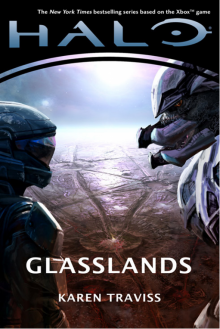 Halo: Glasslands
Halo: Glasslands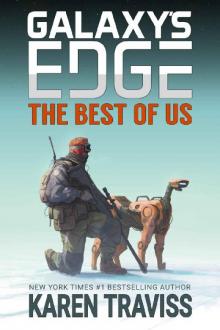 The Best of Us
The Best of Us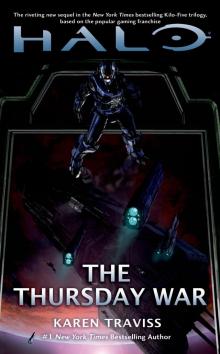 Halo: The Thursday War
Halo: The Thursday War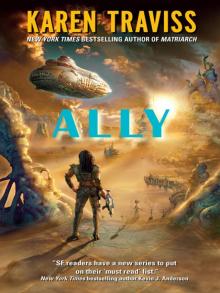 Ally
Ally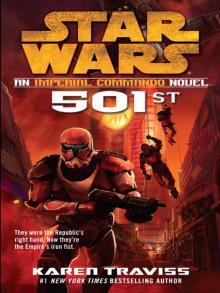 501st: An Imperial Commando Novel
501st: An Imperial Commando Novel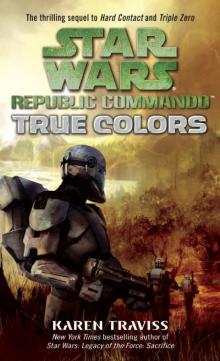 True Colors
True Colors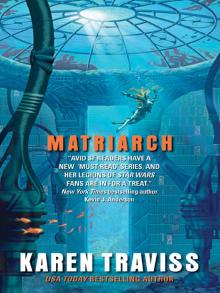 Matriarch
Matriarch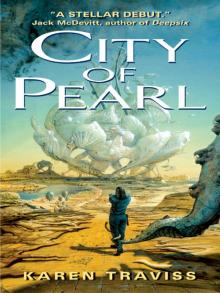 City of Pearl
City of Pearl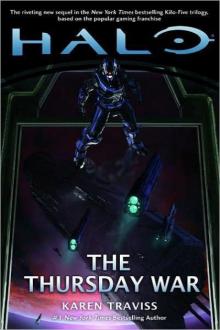 The Thursday War
The Thursday War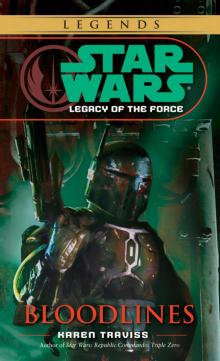 Bloodlines
Bloodlines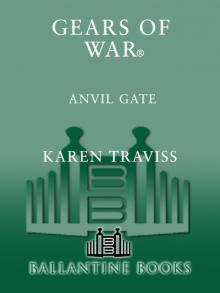 Gears of War: Anvil Gate
Gears of War: Anvil Gate Crossing the Line
Crossing the Line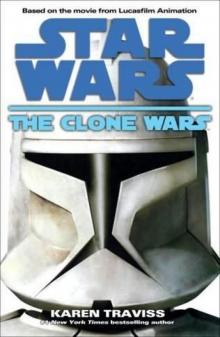 Star Wars - The Clone Wars 01
Star Wars - The Clone Wars 01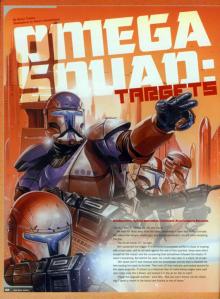 Omega Squad: Targets
Omega Squad: Targets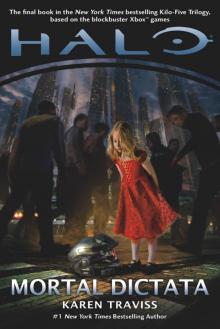 Halo®: Mortal Dictata
Halo®: Mortal Dictata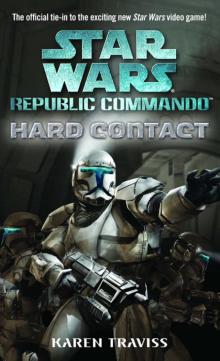 Hard Contact
Hard Contact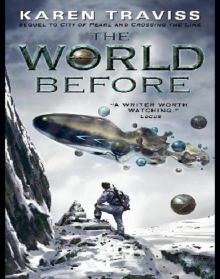 The World Before
The World Before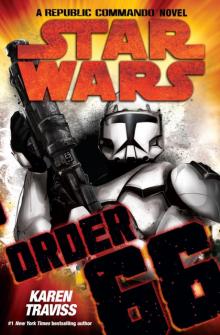 Order 66
Order 66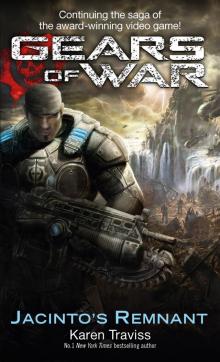 Gears of War: Jacinto's Remnant
Gears of War: Jacinto's Remnant Sacrifice
Sacrifice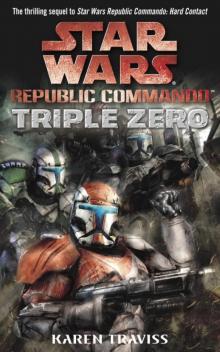 Triple Zero
Triple Zero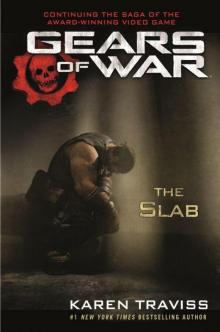 Gears of War: The Slab (Gears of War 5)
Gears of War: The Slab (Gears of War 5)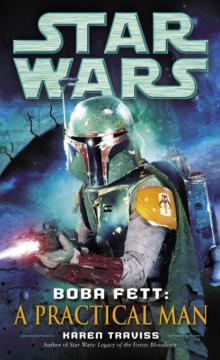 NEW JEDI ORDER: BOBA FETT: A PRACTICAL MAN
NEW JEDI ORDER: BOBA FETT: A PRACTICAL MAN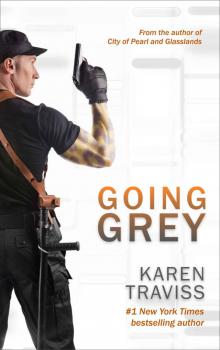 Going Grey
Going Grey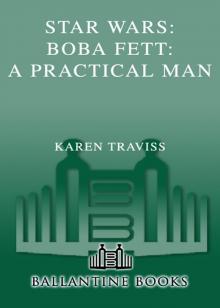 Star Wars: Boba Fett: A Practical Man
Star Wars: Boba Fett: A Practical Man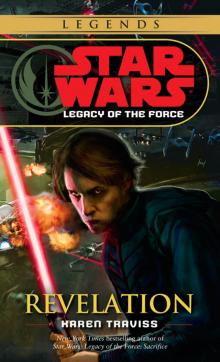 Revelation
Revelation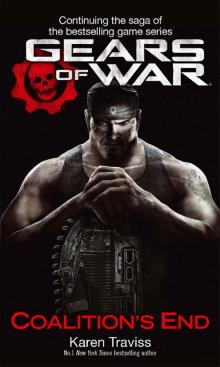 Coalition's End
Coalition's End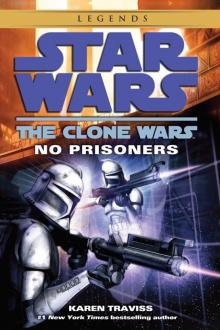 No Prisoners
No Prisoners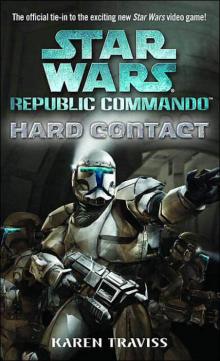 Star Wars Republic Commando: Hard Contact
Star Wars Republic Commando: Hard Contact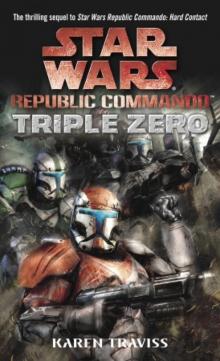 Star Wars: Republic Commando: Triple Zero rc-3
Star Wars: Republic Commando: Triple Zero rc-3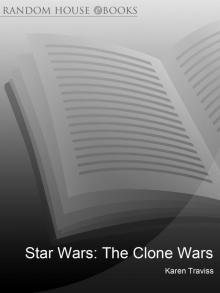 The Clone Wars
The Clone Wars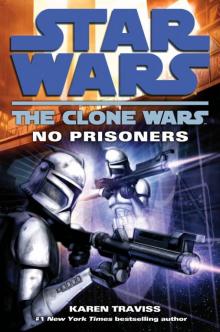 The Clone Wars: No Prisoners
The Clone Wars: No Prisoners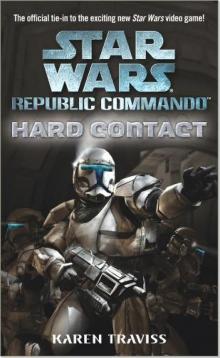 Star Wars: Republic Commando: Hard Contact rc-1
Star Wars: Republic Commando: Hard Contact rc-1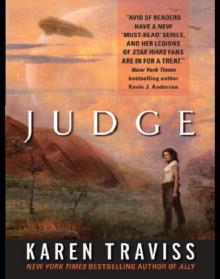 Judge
Judge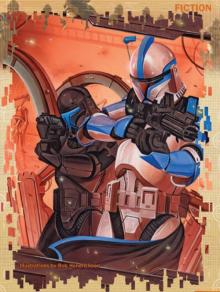 Omega Squad: Targets rc-4
Omega Squad: Targets rc-4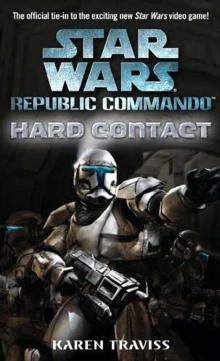 Star Wars - Republic Commando - Hard Contact
Star Wars - Republic Commando - Hard Contact